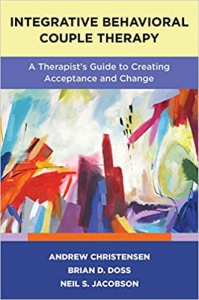by Andrew Christensen, Brian D. Doss, and Neil S. Jacobson

Any counselor working with individual clients should also develop competence for working with couples. Because we have instinctual needs to love and be loved, relationship issues are not foreign to the dialogue counselors have with patients in individual therapy sessions. Even when individual treatment plans do not delineate clear objectives for improving a relationship, counselors often explore solutions for relationship issues with their individual clients. So, why not look for those solutions in the work of three esteemed mental health experts with over 40 years of research and clinical practice in couples therapy?
The book Integrative Behavioral Couple Therapy: A Therapist’s Guide to Creating Acceptance and Change by Andrew Christensen, Brian D. Doss, and Neil S. Jacobson, includes a description of theoretical principles of Integrative Behavioral Couple Therapy (IBCT) along with differences and similarities to other evidence-based treatments. The authors’ description is supported by evidence of the efficacy of IBCT and the application thereof. IBCT is a contingency-shaped application rather than rule-governed. Christensen, Doss, and Jacobson encourage clinicians to use their best judgment when applying IBCT principles. For clinicians working under any capacity of experience, the IBCT concepts are thoroughly explained for the advanced practitioner and the intern therapist or practicum student.
Introduced in the book are two core concepts that promote acceptance and change: empathic joining and unified detachment. Empathic joining facilitates acceptance by kindling compassion and empathy. This leads to forgiveness and support from both individuals of a couple. This is described strategically through observing couple interacting patterns with intention to shift partners away from dissecting actions of the other and toward looking at their own reactions and feelings. Then, using empathic listening skills, IBCT therapists sensitively summarize “hard” and “hidden” emotions to the couple. With unified detachment, partners reduce negative affect by engaging in discussion in the sessions, and then thereafter, about salient incidents and issues in a nonjudgmental way. This kind of dyadic mindfulness allows for a safe, non-blaming analysis of problematic communication and behavior between a couple. IBCT happens in phases, but the core concepts are drawn upon through the entire course of IBCT therapy.
Phases include Evaluation and Assessment—joint session then individual sessions for formulating a DEEP analysis (Differences, Emotional sensitivities, External stressors, and Pattern of communication); Feedback session—conceptualizing problems and description of the intervention; and Intervention sessions. Interventions are both acceptance-focused and change-focused and executed by employing empathic joining and unified detachment, tolerance building, dyadic behavioral activation, and communication and problem-solving training.
Limitations for the IBCT guidebook and the counselor using the principles are that although the knowledge of the theories explained in this work are clearly presented, they still require training, consultation, and supervision to administer. The book includes many case examples of real issues (patient names have been changed to protect identities) presented in real IBCT therapy sessions (some with session videos on the American Psychological Association’s video library website). The case examples cover a rainbow of issues (including clinical consideration for diversity, violence, sexual problems, infidelity, and psychopathology); however, they do not replace the valued learning experience from working with a certified IBCT trainer (which the authors imply). Certified IBCT training involves “extensive observation” of actual sessions. More information is available at https://ibct.psych.ucla.edu/, another online tool that has a chapter devoted to IBCT in brief format using the OurRelationship program—an IBCT website intervention for distressed couples (OurRelationship.com).
Christensen, A., Doss, B. D., & Jacobson, N. S. (2020). Integrative behavioral couple therapy: A therapist’s guide to creating acceptance and change (2nd ed.). W. W. Norton.
Reviewed by: Evan P. Guetz, MA, LPC
The Professional Counselor
